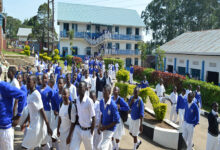Is President Tibuhaburwa Museveni Metamorphosing From “Nochangist” To Changist”?
Surprisingly For The First Time, Opposition Political Party NUP, Was Allowed To Traverse The Country And Open Up Offices

Uganda Today: Is President Tibuhaburwa Museveni Metamorphosing From “Nochangist” To Changist”?
By Oweyegha-Afunaduula
In the title of this article three words are probably new to you: metamorphosing, nochangist and changist. Let me begin by giving you their definitions.
The Oxford Advanced Learner’s Dictionary defines the word “metamorphose” as “to change or make something or somebody change into something completely different, especially over a long period of time”. A word equivalent to metamorphose is “transform”. Thus, the abstract nouns of metamorphose and transform are metamorphosis and transformation.
The word transformation has become very common in everyday speak in Uganda ever since President Museveni used it as a political weapon to harvest votes because he wanted to transform Uganda from a pre-industrial to an industrial society in his singular effort to conquer poverty. Virtually every Programme he has introduced has been geered towards transformation, increasingly towards a money economy.
The programmes include Bonna Baggagawale, NAADS, Operation Wealth Creation, Myooga, and Parish Development Model. Unfortunately, virtually all of them have been more of islands of poverty generation, and hence failure stories, than prosperity generation, and hence success stories, for the targeted rural populations. They have instead enriched those supposed to implement them or release money for them. They have thus been deceptive programmes.

If you have done some Biology (the study of living things) at O-Level, which you should have, or been a keen observer in your environment, you must have noted that there is a stage in the life cycle of some insects such as the butterfly, when they live as catapillars for some time. Then they metamorphose, or transform into an adult forms, that can use their mouth parts to feed themselves. A good example is when locusts, newly metamorphosed from catapillars, attacked Uganda recently and gregariously fed on crops and other vegetation.
Most Ugandans had never experienced locust attacks in the country before.
In Uganda, since 1986, we have socio politically metamorphosed from strictly military governance (1986-92) to military governance interspersed with elective politics within single party National Resistance Movement (NRM) governance (1994-1996), to quasi-multi-political association governance, with the centrality of NRM unchallenged and security organs used to separate political parties from the population, ostensibly for security reasons; to deceptive multiparty politics (2006-present), with political parties effectively excluded from the population and, therefore, unable to recruit new members from amongst the increasingly youthful populace. If there has been any change it has been change within President Tibuhaburwa Museveni’s preferred “NO CHANGE” framework.
In this article I want to amplify and apply the words metamorphose, metamorphosis and change, and the phrase “no change” to Uganda’s perennial President for more than 37 years: Tibuhaburwa Museveni.
Very early in his reign, the President made it clear that he had captured political power through the barrel of the gun to stay in power as long as he possibly could when he said, “a mere piece of paper cannot remove me from power”, adding, ” I am a quarterpin of a bicycle. I came in by knocking and can only leave by knocking”.
Therefore, if the NRM governments have been habitually organizing elections since 1996, they have not been for change but no change. They have been a means to legitimize the regime, and to give the false impression that NRM and President Tibuhaburwa Museveni are popular under whatever social, economic, political, economic and enviromental circumstances.
For example, for most of the last 37 years of NRM rule, there has been widespread outcry about land grabbing by people from outside Uganda but posing as Ugandans, even constitutionally, and social, economic, ecological and environmental decay and collapse. However, every election organized by the regime has produced non-changing results, all indicating incremental popularity of NRM and President Tibuhaburwa Museveni within the framework of No Change detested by many Ugandans, and favouring Apartheid- like governance of Uganda.

In practice, President Tibuhaburwa Museveni pursues No Change in leadership and governance in Uganda, increasingly politico-military, with soldiers assuming centrality in every sphere of life and economy, and capturing every institution, project and Programme. Government is firmly under the military despite elective politics. Many serving soldiers that profess loyalty and belonging to NRM hold political posts, including positions in Cabinet. They also hold elective positions in District Council and Parliament, while others serve as Resident District Commissioners and security agents in both the Internal Security Organisation (ISO) and External Security Organisation ((ESO), indicating that the country is militarily occupied and militarily expressed.
The President himself is a soldier who pronounced in 1996 that he had retired from the army, but at every opportunity dones military uniform and uses the Command and Obey approach to both leadership and governance. Other soldiers are heading institutions of Government, and civilians are necessarily subordinate to them, however professional, expert or experienced they are in their areas of jurisdiction.
May be thse are some of the fundamental changes the President talked of when, on the day he first swore in as President of Uganda, he said, “This is not a mere change of guards. It is a fundamental change”.
Despite his commitment to No Change, the President has been persistent and consistent in his use and application of the words “change” and “transformation” in his interaction with rural populations, industrialists and investors and pursuit of development. If we go by his daily words, he wants to change or transform Uganda into a mid-income economy.
Therefore, the President has been oscillating between a “Nochangist” politically and a “Changist” economically.
However, he has also been consistent and persistent in his application of the word “My” even where the word “Our” would have been more appropriate to apply, especially where resources (mainly money, natural resources) are publicly-owned and government is a trustee.
Thus, it is not uncommon to hear the President say, My voters”,”My investors”, “My oil”, “My money”, ” My Army”, “My Country” instead of “Our voters”, “Our Oil”, “Our investors”, “Our money”, “My Army”,”Our Country”. However, I have not heard him say “My Parliament” although he has been able to maintan an absolute majority of Members of Parliament the way General Napoleon Bona Parte was, ultimately using it to convert himself to Emperor of France.
We can, to a certain extent, say that the President is a “Myist”, not an “Ourist”. Everything begins with him and ends with him. He is, therefore, a practitioner of exclusionism, not inclusionism. Inclusiveness is alien to him. This could explain why very early in his rule he preferred individual approach to politics and everything, which has resulted in individuals associated with the regime individualizing everything that is public. It probably also explains why he said he is not a servant of anybody, although in reality he is the topmost servant, not master, in the country, and that he works only for himself, his family and grandchildren despite the fact that a large portion of the country’s national budget sustains him and his family.
We don’t know what is likely to happen if the President succeeds in converting the government institution away from being a trustee over land to being the overall owner of land. By constitutional design he has already decreed that land below the ground belongs to government, as if the below ground and above ground are “ecologically-seperate. However, it is likely that, just as was the case during the Green Revolution in South East Asia, our population will no longer be attached to the land. It will be a floating population.
It is probably true that the Uganda Constitution 1995, whose making the President presided over, and which gives too much power and authority to the institution of the President, is one of the reasons why the President is more likely to use “My” instead of “Our”.
However, it could also be both a cultural and upbringing issue, whereby the principle of sharing is only weakly emphasized or completely ignored. The President belongs to the nomadic-pastoral human energy system whose members believe that all heads of cattle on Earth belong to them. By extension, everything belongs to them. This could be one major explanation of widespread corruption among the members of the nomadic-pastoral human energy system. I don’t know how the Inspector General of Government (IGG) has strategized to handle corruption with origins in this human energy system, which knows no restraint and no constraints in its collective mind.
Much political corruption and exclusion can be explained by reference to this human energy system.
Until recently when the President of the National Unity Platform (NUP)was allowed by President Tibuhaburwa Museveni to open branches for his party, we had become used to the truism that only the President and his son, Muhoozi Kainerugaba, were the only ones who could lead processions in the political show of popularity under heavy military and police gear. We woke up to the rare reality that the National Unity Platform (NUP), Kyagulanyi Ssentamu, unlike before when he would be hunted and haunted by the army and police and his people dispersed by tear gas and gun shots, was allowed to hold big rallies and to open Party Offices in Mbarara, Fort Portal , Kasese and Kabale in Western Uganda.
Although Prime Minister Nabbanja claimed that Kyagulanyi ferried people from Kampala to Western Uganda to compose his huge crowds, it is most likely that he did not. He had already been a well known musician and politician who was for the first time moving freely addressing people. Many people, especially the young, were curious to see him at close range for the first time.
The questions to ask are:
Is President Tibuhaburwa Museveni metamorphosing from a Nochangist to a Changist?
Is President Tibuhaburwa Museveni genuinely opening up to multiparty politics and to share the political spectrum equitably with other political parties?
Is President Tibuhaburwa Museveni tired of being the only bull in the Kraal?
Is President Tibuhaburwa Museveni now ready to secure all opposition leaders with public security organs?
Is President Tibuhaburwa Museveni now ready to de-emphasize hereditary politics and allow genuine people’s choices to determine our leaders and governors?
If all this is yes, then why has he been so eager to swallow other parties such as the Uganda Peoples Congress (UPC) and the Democratic Party (DP); fracture the Buganda Cultural Institution by clandestinely meeting some Buganda Clan leaders along with impositors, and give them money, ostensibly to undertake development, but without the knowledge of the Katikkiro and Kabaka of Buganda?
Are we likely to see Uganda move from the status of a closed society, in which leadership is sought only through the barrel of the gun to an open society in which people are genuinely liberated both physically and mindwise and enjoy a long latitude of freedom to express themselves politically and intellectually without fear or favour, and can individually engage in critical thinking, independent thought and alternative analysis without being victims of propaganda?
If all this is true, then it is the greatest gift to Ugandans in the 21st Century. Ugandans will for the first time since 1986 collectively feel that they are free, sovereign and an independent nation.
For God and My Country.









